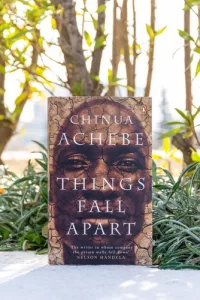“Things Fall Apart” by Chinua Achebe : An Honest Review
The literary masterpiece Things Fall Apart by Chinua Achebe has had a lasting impact on African literature. It describes the life of Okonkwo, an Igbo warrior, and how colonialism affected his community in 1958. According to Wikipedia, Things fall apart is Chinua’s debut novel.
Plot Summary
The story is set in the 1890s in the Nigerian village of Umuofia. This story features Okonkwo, a respected warrior who has risen through the ranks of his tribe to become the leader of it. However, as the British colonizers enter his community, he struggles to reconcile his pride with what is happening around him.
Umuofia’s traditional way of life is disrupted by the arrival of the British, who bring their religion and government with them. Okonkwo’s increasing violence and aggression toward those who are betraying his culture is a result of his desperate need to maintain his status.
The novel ends in tragedy as Okonkwo commits suicide in response to the economic and political challenges brought about by colonialism.

Themes
Achebe’s novel explores a number of important themes, including:
- Cultural Conflict
- Gender Roles
- Fate and Destiny
Cultural Conflict
An important theme of the novel is the conflict between traditional ways of life and colonialism’s changes. In the face of rising social change, Okonkwo, who is fiercely proud of his culture, struggles to adapt. He sees the arrival of the British as a threat to his way of life and becomes increasingly violent and aggressive in his attempts to defend it.
Gender Roles
Gender roles in Igbo society are also explored in the novel. The traditional view of women is that they are inferior to men and ought to be subordinate to their husbands. In Achebe’s stories, however, female characters are independent and strong, challenging these traditional roles.
Fate and Destiny
Okonkwo’s tragic fate is also one of the novel’s major themes. It is not only the decisions he makes that shape his life, but also external forces that affect it. In the end, British arrival and the changes they bring have a profound impact on his life and ultimately lead to his downfall.
Read up on 7 Thrilling Things to Do in Olumurin Waterfalls
A trip to Erin Ijesha Waterfalls (See photos and Video)
Writing Style
Achebe’s writing style is simple and direct, but also rich in detail and imagery. He uses traditional African storytelling techniques, including proverbs and folktales, to bring the culture of Umuofia to life.
His use of language is also notable. He writes in English, but incorporates Igbo words and phrases, giving the novel a unique voice and a sense of authenticity.
Critical Reception
Since its publication, Things Fall Apart has received widespread critical acclaim. With more than 50 languages translated into it, it is widely regarded as a seminal work of African literature.
Although the novel has been praised for its portrayal of African culture, it has been criticized as well. There have been claims that Achebe romanticizes precolonial Africa, and portrays the Igbo people in a simplistic and one-dimensional manner.
Conclusion
Overall, Things Fall Apart is a powerful and thought-provoking novel that explores important themes of culture, gender, and destiny. Achebe’s writing style is both accessible and engaging, and his use of traditional storytelling techniques adds to the novel’s authenticity.
While the novel has its detractors, it remains an important work of African literature and a testament to the enduring power of storytelling.

